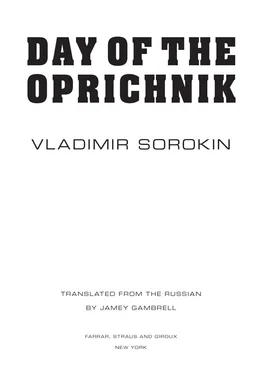Sorokin, Vladimir - Day of the Oprichnik
Здесь есть возможность читать онлайн «Sorokin, Vladimir - Day of the Oprichnik» весь текст электронной книги совершенно бесплатно (целиком полную версию без сокращений). В некоторых случаях можно слушать аудио, скачать через торрент в формате fb2 и присутствует краткое содержание. Год выпуска: 2011, Издательство: Farrar, Straus and Giroux, Жанр: Старинная литература, на английском языке. Описание произведения, (предисловие) а так же отзывы посетителей доступны на портале библиотеки ЛибКат.
- Название:Day of the Oprichnik
- Автор:
- Издательство:Farrar, Straus and Giroux
- Жанр:
- Год:2011
- ISBN:нет данных
- Рейтинг книги:5 / 5. Голосов: 1
-
Избранное:Добавить в избранное
- Отзывы:
-
Ваша оценка:
- 100
- 1
- 2
- 3
- 4
- 5
Day of the Oprichnik: краткое содержание, описание и аннотация
Предлагаем к чтению аннотацию, описание, краткое содержание или предисловие (зависит от того, что написал сам автор книги «Day of the Oprichnik»). Если вы не нашли необходимую информацию о книге — напишите в комментариях, мы постараемся отыскать её.
Day of the Oprichnik — читать онлайн бесплатно полную книгу (весь текст) целиком
Ниже представлен текст книги, разбитый по страницам. Система сохранения места последней прочитанной страницы, позволяет с удобством читать онлайн бесплатно книгу «Day of the Oprichnik», без необходимости каждый раз заново искать на чём Вы остановились. Поставьте закладку, и сможете в любой момент перейти на страницу, на которой закончили чтение.
Интервал:
Закладка:
I drive up to the house. There’s red all over from our Mercedovs. Like ladybugs around a piece of sugar, they’ve crowded around the house. I get out of the car and walk to the carved stone entrance. Batya’s stern doorkeepers let me in silently. I enter, throw my caftan to the servants’ waiting hands, and run down the stairs to a set of wide doors. Two guards in light-colored caftans stand by them. They bow, open the doors—and what a hubbub! The dining hall buzzes like a beehive. The sound dispels all exhaustion.
The great hall is completely full, as always. The entire Moscow oprichnina sits here. The chandeliers shine, candles burn on the table, gilded forelocks shimmer, little bells sway. Glorious! I enter with a bow to the floor, as is fit when you’re late. I proceed to my place, closer to Batya. The long tables are arranged such that all abut one central table, where Batya sits with the two wings —the right and left. I sit down at my lawful place—fourth from Batya on the right, between Shelet and Pravda. Batya winks at me while taking a bite of a savory pie. It’s no sin to be late here: we all have business to take care of, and sometimes dinner drags on till after midnight. The servant brings me a bowl of water, I wash my hands, dry them with a towel. And what do you know?—everyone’s just moving on to the next course. The servants bring in Batya’s grilled turkeys. And on the tables there’s bread and marinated cabbage. At weekday repasts Batya doesn’t care for all sorts of lavish dishes. There are carafes of wine, kvass, and springwater to drink. No vodka here on weekdays.
Pravda pours me some wine:
“So, Brother Komiaga, too many irons in the fire?”
“That’s right, Brother Pravda.”
I clink glasses with Pravda and Shelet, and empty my goblet in one gulp. I realize that I haven’t eaten a serious meal in some time: with Her Highness I couldn’t swallow a bite, I was so nervous. Hunger isn’t a maiden—you can’t treat it to a mere sturgeon-spine pie. Just in time, oh, just in time the servant places a dish with turkey, baked potatoes, and steamed turnip on the table. I pull off a turkey leg for myself, and sink my teeth into it: it’s good, roasted to a T in Batya’s wonderful stove. Shelet rips off a wing, and smacks his lips:
“You can’t eat better anywhere than at our Batya’s!”
“That’s the holy truth!” Pravda belches.
“One thing’s for sure,” I mutter, swallowing the juicy turkey meat. “Our Batya feeds and warms us, gives us a living, and teaches us how to keep our heads on our shoulders.”
Out of the corner of my eye I glance at Batya, and he, our heart and soul, senses our affection and winks while eating his meal, slowly, as always. We all feel protected by him. Thank God.
I eat, glancing at Batya’s table now and then. At the edges, where the oprichnik wings end, honored guests sit, as is customary. Today as well: on the right is the broad-shouldered Metropolitan Kolomensky with the gray-bearded paraxyliarch of Yelokhovsky Cathedral; the ten-pood chairman of the All-Russian Society for the Observance of Human Rights wearing the badge of the Alliance of St. Michael the Archangel; smiling Father Germogen, Her Highness’s spiritual adviser; some young official from the Trade Department; the trade rep of the Ukraine, Stefan Goloborodko; and Batya’s old friend the entrepreneur Mikhail Trofimovich Porokhovshchikov; on the left is the oprichnina’s devoted doctor, Pyotr Sergeevich Vakhrushev with his eternal assistant Bao Cai; the imposing one-eyed commander of the Kremlin regiment; the folk singer Churilo Volodevich; the inevitably disgruntled Losiuk from the Secret Department; the Russian boxing champion Zhbanov; Zakharov, the round-faced Treasury representative; Batya’s game warden, Vasya Okhlobystin; the boyar Govorov; and the head Kremlin bathhouse attendant, Anton Mamona.
Batya lifts his wineglass and stands. The commotion dies down. In a stentorian voice, he proclaims:
“To His Majesty’s health!”
We all stand:
“To His Majesty’s health!”
We drain our glasses. Wine isn’t champagne, though, you can’t gulp it down. We drink slowly. We grunt, wipe our mustaches and beards, and sit down. Suddenly, like thunder from the heavens, a rainbow frame appears on the ceiling of the hall, and a painfully familiar, narrow face with a dark blond beard appears. His Majesty!
“I thank you, oprichniks!” His voice carries throughout the hall.
“Long live His Majesty!” Batya cries.
We take up the call threefold:
“Long live, long live, long live His Majesty!”
“Hail!” His Majesty answers, smiling.
“Hail! Hail!! Hail!!” sweeps across the hall like a great wave.
We sit, lifting our faces to him. Our sun waits for us to calm down. He gazes at us warmly, with a fatherly expression:
“How was your day?”
“Work and Word! We Live to Serve, Your Majesty! Good! Thank God!”
His Majesty pauses. He looks us all over with his transparent eyes:
“I know your work. I thank you for your service. I rely on you.”
“Hail!!” cries Batya.
“Hail!! Hail!!” we repeat.
The ceiling hums with our voices. His Majesty looks down from it:
“I want your advice on a certain matter.”
We immediately quiet down. That’s how His Majesty is: he values advice. This is his great wisdom, and his great simplicity. That’s why our state flourishes under him.
We sit holding our breath.
Our Sun takes his time. Then he speaks:
“About the mortgages.”
Now it’s clear. We understand. The Chinese mortgages. An old problem. A tangled knot. How many times has His Majesty threatened to cut it open, and his own people got in the way, held him back. And not only his own , but some of us. And outsiders. And simply—others…
“A half hour ago I had a conversation with Zhou Shen Min. My friend, the Celestial Ruler, is concerned about the situation of the Chinese in western Siberia. You know that after I issued the decree forbidding the transfer of the local volosts under mortgage to the districts, things seemed to straighten out. But as it turns out, it wasn’t for long. The Chinese are now getting mortgages not with the volosts , but with the settlements that have no landholdings under the so-called Tan Xu 13buy-up with business petitions, so that our district officials have the right to register them as contract laborers rather than as taxed persons. They use the law On the Four Taxes. The tax collectors in the district councils, as I’m sure you realize, have been bought by them and register them not as taxpayers but as temporary hired workers with bag and baggage. And temporary workers are contract laborers according to the new regulations. It turns out that they cultivate allotments of arable land, but pay the tithe only as contract laborers, since their wives and children are listed on the shares as six-month parasites. Therefore, the district assessments of all the six-month-untaxed parasites are divided not in half, but two to three. Consequently, every six months China loses a third of its tithes. And the Tan Xu buy-up helps the Chinese living in our country to deceive their Celestial Ruler. Considering that there are twenty-eight million Chinese in western Siberia, I quite understand the concern of my friend Zhou Shen Min: China loses almost three billion yuan every six months. Today I had a conversation with Tsvetov and Zilberman. Both ministers advised me to get rid of the law On the Four Taxes.”
His Majesty stops speaking. So that’s what it is! Once again the tax law has stuck in the craw of one of the departmental clerks. They didn’t get to share the lucre, the thieves!
“I want to ask my oprichnina: What do you think about this whole issue?”
Читать дальшеИнтервал:
Закладка:
Похожие книги на «Day of the Oprichnik»
Представляем Вашему вниманию похожие книги на «Day of the Oprichnik» списком для выбора. Мы отобрали схожую по названию и смыслу литературу в надежде предоставить читателям больше вариантов отыскать новые, интересные, ещё непрочитанные произведения.
Обсуждение, отзывы о книге «Day of the Oprichnik» и просто собственные мнения читателей. Оставьте ваши комментарии, напишите, что Вы думаете о произведении, его смысле или главных героях. Укажите что конкретно понравилось, а что нет, и почему Вы так считаете.












